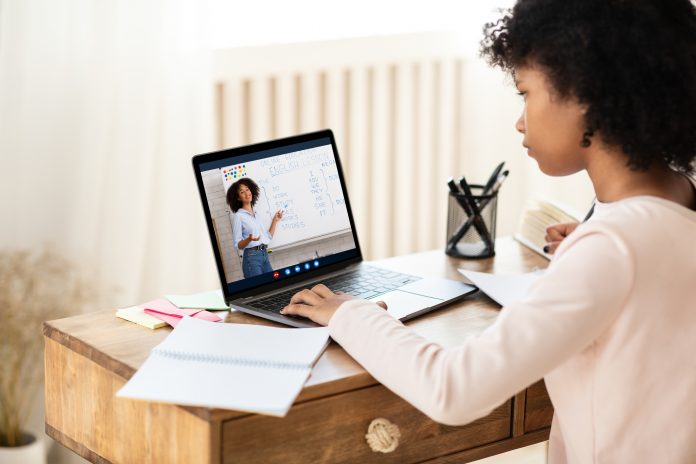Here we report on the EdTech Demonstrator Programme funded by the Department of Education to help schools and colleges meet the challenges of remote teaching and learning as the second wave of COVID strikes
As wave 2 of COVID strikes and more and more lecturers, teachers and pupils test positive, schools and colleges across England are once again sending bubbles of students home to learn remotely.
The Demonstrator Programme, funded by the Department of Education and partnered with – LGfL the National Grid for Learning, the Education Foundation and the Sheffield Institute of Education at Sheffield Hallam University – is helping schools hit the ground running with remote education, providing expert advice and guidance when they need it most.
Launched in late April the EdTech Demonstrator Programme was set up to connect carefully selected remote teaching and learning experts in state-funded schools, multi-academy trusts and colleges with primary and secondary schools and further education providers struggling due to COVID.
Charged – literally within days – with the task of implementing systems to deliver effective remote teaching and learning, many schools and colleges that had not adopted technology effectively found it a challenge. Many teachers and lecturers cited a lack of confidence and knowledge as inhibiting their ability to use technology effectively. Demonstrator schools came swiftly to their rescue offering practical support to up-skill teachers and staff and equip them with the confidence to adapt to the immediate changes to the status quo taking place within education. Many of the EdTech Demonstrators also published – and still are publishing – helpful resources to assist others on the EdTech Demonstrator programme website.
Commenting on the programme, Kriss Baird, London Lead for the Demonstrator Programme, said, “I am one of a team of regional leads working on this national programme. It is our task to firstly understand the objectives of schools and colleges that would like to tap into this free support. We then find a match with one of the Demonstrators and empower them to create plans of action. Examples include programmes to address and close teachers’ digital skills gaps, or assistance establishing a more strategic approach to better engage with parents and students in remote learning scenarios.
“In London, my patch, we now have seven Demonstrator Schools helping teachers answer these tough questions: Cheam Common part of LEO Academy Trust, Shacklewell Primary part of New Wave Teaching School Alliance, Reach Academy in Feltham, Heronsgate Primary in south east London, Britannia Village Primary School part of BV Trust, Redden Court School, and La Sainte Union Secondary. Each of the Demonstrator Schools and Colleges share a wealth of experience, enthusiasm and motivation to help senior leaders and teachers overcome challenges bespoke to each setting. All have different expertise and platforms for helping others make their own decisions.
“Demonstrators work closely with school leaders to unpack, define, and help implement their school’s digital strategy for teaching and learning both in and out of the classroom. Our approach is one of empathy. We understand that, while there may be uniform challenges faced by all education institutions, each has its own nuanced needs and faculty profile, with a range of skills levels and appetites for new, disruptive ways to deliver teaching and learning.
“During this initial onboarding process it is vital for schools and colleges receiving the support to first consider: “What has our journey been to date?” and then: “How does currently fit with our teaching and learning strategy?”, so that the Demonstrator School begins with a baseline of knowledge. Digital strategy comes first and the minutiae of tech functionality second. Or, perhaps, “pedagogy before tools” is a more appropriate mantra.”
Upskill teachers and staff
First and foremost, the Demonstrators Programme is about providing practical support to upskill teachers and staff so they are equipped and confident to adapt to the immediate changes to the status quo happening right now in education. On the LGfL EdTech Demonstrator website, many of its demonstrators are publishing helpful resources to assist others.
An example is Cheam Common’s great advice on hosting remote assemblies with the whole school in attendance. At a time of school budget pressures, it is welcome that the government and the sector can work together to identify how to support schools and understand how technology budgets and professional learning can be maximized to deliver teaching and learning outcomes.
There is also a major role for regional local authorities to play. In the boroughs of London, conversations with council’s heads of professional learning are happening. These officers need to be responsive to the pressures that schools in their areas face, and to provide practical advice and guidance beyond the Department for Education’s evolving policy.
Kriss continued, “I am beginning to work closely with borough councils such as Enfield, which has established an Action Group, constituting around a dozen or so senior leaders from schools in the local area. These primary and secondary school leaders are helping pave the way for nearly 100 learning providers in the borough by developing thought leadership and strategic plans to introduce an updated offer for teacher-centric continued professional development.
“In this instance, intra-borough collaboration is vital. Local education authorities are responsible for education in their jurisdiction, so should play a part in helping to demonstrate the art of the possible. Their role can be to interpret government guidance and translate it into a more practical understanding. They can provide a suite of services for educators going beyond the remit of the Demonstrators Programme, such as illustrating modes of practice seen to work elsewhere. LAs must put the context of these new modes for teaching and learning into language teachers understand today. Otherwise, at best it won’t be accepted or at worst won’t be understood.”
This point was seconded by Tim Stirrup, Demonstrator Lead for the Midlands and North East, who said, “The onset of COVID has created a ‘moving agenda’ for schools, colleges and their Demonstrator Schools who in addition to providing support must efficiently run their own institutions.
“Schools and colleges in the Midlands were the first to experience lockdown in July. The North East has also been particularly badly hit, with some schools reporting a significant shortfall in teaching staff that are off sick or forced to self isolate as a result of coming into contact with someone that has tested positive for COVID. It’s not just a question of helping them with their remote connectivity but also resources that can be used to maximise learning when staff are unable to teach too. It’s all very well having a strategy, but what do Heads do when they are rung up at 10 pm at night and told Year 10 can’t come in? Demonstrator Schools are helping their regional schools manage the crisis and make the most of what they already have.
“Schools and colleges can also access a wide variety of Demonstrator webinars housed on the LGfL website covering, to name but a few, practical teaching and learning, making short and engaging instructional videos, creating accessible digital content for special educational needs learning and digital storytelling. Anyone can join these webinars which illustrate that a digital strategy is now more than just a ‘nice-to-have’ and marks an important step-change in England’s education system”, he said.
“Innovators and the early adopters of technology-enabled-learning are no longer seen as hobbyist enthusiasts. They are trailblazers in their profession, helping empower colleagues. We should celebrate their success in helping others. Teachers and leadership teams in schools and colleges up and down the country are making vitally important tech-enabled strides that will impact millions of students and strengthen the foundations for the next generation of teaching and learning.”











